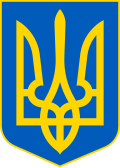| First Deputy Prime Minister of Ukraine Перший віце-прем'єр-міністр України | |
|---|---|
 | |
| Member of | Cabinet of Ministers |
| Seat | Government Building, Kyiv, Ukraine |
| Nominator | Prime Minister of Ukraine |
| Appointer | Supreme Council of Ukraine |
| Term length | No fixed term |
| Constituting instrument | Article 9 (About the Cabinet of Ministers of Ukraine) |
| Inaugural holder | Kostiantyn Masyk (since the independence of Ukraine) |
| Formation | 1946 (as First Deputy Chairman of Council of Ministers) |
| Website | www.kmu.gov.ua/control/en |
First Deputy Prime Minister of Ukraine is a government post of the Cabinet of Ukraine. In the absence of the prime minister of Ukraine, the first vice prime minister performs their duties [a] as the acting prime minister. In 1991, the post was grandfathered from the already existing first deputy chairman that was part of the Council of Ministers of the Ukrainian SSR.
Contents
- List of first deputy prime ministers of Ukraine
- Council of Ministers of the Ukrainian SSR
- Cabinet of Ministers of Ukraine
- Notes
- References
- See also
- External links
In an absence of the first vice prime minister, their functions are performed by other vice prime ministers who are members of the Cabinet of Ministers. Similarly to the prime minister, all official duties of the first vice prime minister are supported by the Secretariat of the Cabinet of Ministers.
Along with other members of the Cabinet of Ministers, a newly appointed first vice prime minister takes the same oath of office at a plenary session of the Verkhovna Rada (Ukrainian parliament). According to Article 10 of the Law of Ukraine about the Cabinet of Ministers, a member of the Cabinet of Ministers (except the prime minister) who refuses to take the oath is considered to have refused to accept the post. Every newly appointed member of an already existing cabinet needs to take the oath at the next plenary session of the Verkhovna Rada.
























